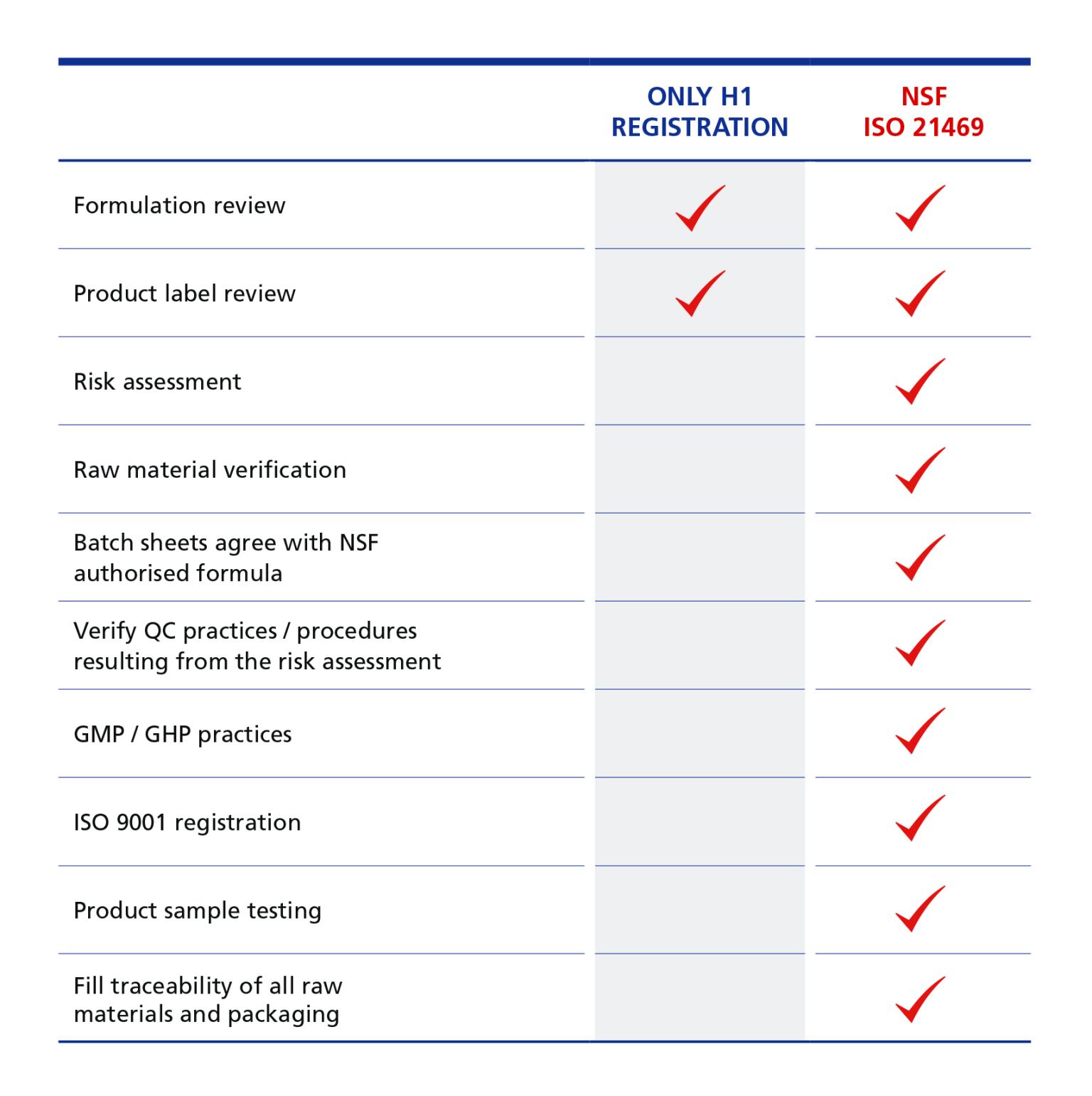H1 Food grade lubricants
H1 lubricants are food grade lubricants used in the food and beverage industry. In this area, very special requirements are placed on the lubricating oils and greases used. In the manufacturing process of food and beverages, contact with the lubricants used can often not be avoided from a technical point of view. Thus, they must be safe to use.
In addition, the specialty lubricants must guarantee a smooth manufacturing process, meet the high technical requirements of the machines and be able to keep production efficiency at a constant level. All of this with additional consideration of food safety during the entire production process.
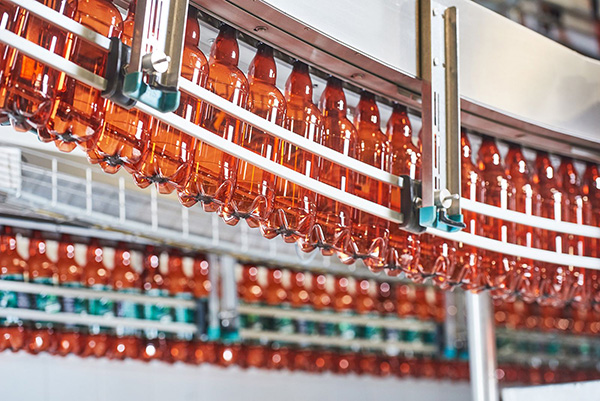
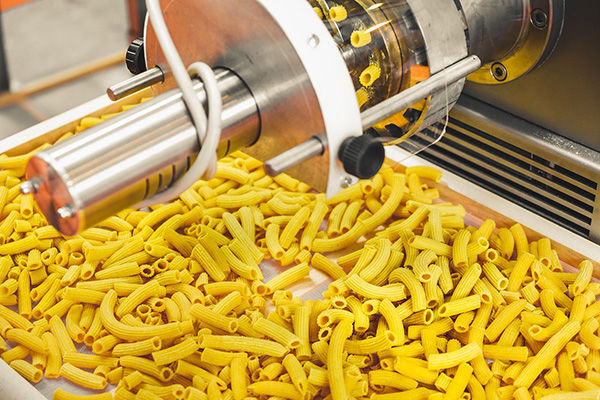
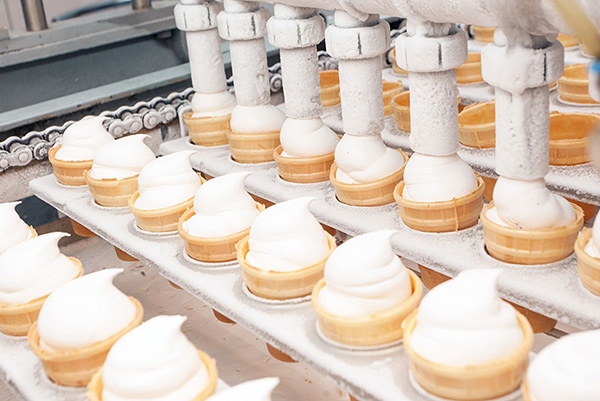
Further information on H1 food grade lubricants:
Special requirements for food grade lubricants
Each food production facility has different requirements for H1 lubricants. In the production of frozen goods, for example, the challenge lies in the extreme cold, in the case of preservation in the extreme heat. Food grade lubricants must also be resistant to salts, blood and fat in meat processing. In the production of fruit juices, on the other hand, resistance to aggressive fruit acids is required. Even in the production of cakes and bread, H1 lubricants must be able to withstand a number of adversities. In this case, it is mainly sugar and flour dust.
The selection and formulation of food grade greases, compressor oils, hydraulic fluids, gear oils or refrigeration machine oils is complex and requires a great deal of practical experience and corresponding specialist knowledge. The comprehensive portfolio from FUCHS offers the right lubricant for most applications in the food and beverage industry.
Performance of food grade lubricants
Due to their chemical composition, synthetic lubricants in particular not only meet all the requirements of the FDA (Food and Drug Administration), they also have high-quality technical properties. H1 lubricants are often even superior to conventional lubricants in terms of low-temperature properties, water resistance, longevity and resistance to environmental influences. However, the selection of a suitable lubricant is not always easy, as these must meet the technical requirements and ensure compliance with the legal regulations in terms of food safety and consumer protection. In the food and beverage industry, lubricants may only be used if they have been explicitly approved. For some time now, there has even been a new EC directive that also requires approval for feed production.
NSF certification
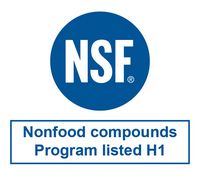
The National Sanitation Foundation (NSF) is an institution that has been responsible for carrying out tests for the protection of food, writing standards and guidelines and certifying products since the mid-1940s. The HACCP point concept (Hazard Analysis and Critical Control Points Concept), which has been in use in the European Union since 2006, also includes NSF approval when it comes to making food production consistently safe.
If lubricants can come into contact with food during the production process, the company needs NSF approval for these greases or oils. It does not matter whether the contact with the products is unavoidable or only possible occasionally. According to international regulations, the company may only use lubricants that have been marked with H1 by the NSF.
The NSF offers a variety of services for a wide range of industries. One area of the NSF that is relevant for manufacturers of lubricating oils and greases is the certification of non-food compounds. In terms of their materiality, non-food compounds are not food, but can be used in the food and beverage industry. Due to possible food contact, strict rules and strict standards apply to non-food compounds. The NSF has launched a special certification program for these components, which also include H1 food grade lubricants.
Certificates & approvals

Important certifications and classifications at a glance
In addition to H1 certification, there are several other important certifications and classifications in the food and beverage industry that must be taken into account.
- H1 lubricants are used when no or only incidental contact with food is to be expected under normal operating conditions.
- H2 lubricants are used on equipment in the food production process where food contact can be completely excluded.
- H3 lubricants are used as corrosion protection, e.g. for knives and hooks. As with H2, the possibility of contamination with food must nevertheless be completely excluded.
- 3H lubricants are used when direct and continuous contact between the lubricant and food products is unavoidable.
- Food Grade describes auxiliary and operating materials that are preferably used in the food and beverage industry and comply with the laws and guidelines that apply there.
- ISO 21469: Internationally valid standard that takes into account the hygiene requirements during the entire life cycle of an H1 lubricant from formulation to production and application. The test procedure is carried out by the NSF and is considered the strictest certification for food grade lubricants worldwide.
- Kosher: Lubricants that are kosher certified may be used in the production of foods that are produced in compliance with Jewish dietary laws.
- Halal: Lubricants according to Halal certification may be used in the production of food in compliance with Islamic dietary laws.
- EHEDG: The European Hygienic Engineering Design Group is a cooperation between machine manufacturers, the food industry, research institutes and authorities, which has set itself the goal of promoting food safety through improvements in hygiene technology and planning in all areas of food production.
- HACCP: A quality tool designed to check the production of food according to Hazard Analysis and Critical Control Points. This is intended to prevent consumers from becoming sick or injured in connection with food.
- BRC: Global standard for food safety from the British Retail Consortium (BRC), according to which companies that handle and process food can be certified.
ISO 21469 certification inspires confidence
In the food, cosmetics, pharmaceutical, beverage and animal feed industries, lubricants with ISO 21469 certification are indispensable. Thus, the manufacturer of food grade lubricants shows that the production of its H1 lubricants was also carried out under strict hygiene measures. The annual audits are conducted by the NSF and also take into account upstream and downstream processes such as the packaging or storage of the food lubricants.
FUCHS has various production sites around the world that are certified according to ISO 21469. Not only in Germany, but also in the USA, in Brazil and in South Africa. We can therefore guarantee a high level of food safety for our H1 lubricants worldwide.
MOSH and MOAH in the food and beverage industry
The potential transfer of hydrocarbon compounds to food has been analyzed and discussed for a long time. The chemical compounds MOSH (mineral oil saturated hydrocarbons) and MOAH (mineral oil aromatic hydrocarbons) are of primary interest. Reports appear again and again in the media that food has been contaminated accordingly.
Mineral oils should never come into contact with food. If they get into the human body through food intake, they can cause health damage.
MOSH and MOAH can basically have different origins. If a high proportion is detected, all possible causes must therefore be checked. Contamination often comes from packaging materials that come into direct contact with the food. To avoid contamination by lubricants, H1 lubricants should always be used in the production process of food and beverages.
CASSIDA food grade lubricants from FUCHS
Fully synthetic lubricating fluids
CASSIDA lubricating fluids, which were developed on the basis of fully synthetic base oils, meet the most varied of industry specifications as well as the strict guidelines for food-grade H1 lubricants. The high-performance lubricating fluids of the CASSIDA series enable the efficient operation of demanding manufacturing processes, a higher utilization of machines and a reduction of maintenance costs. They are used in various areas of the food and beverage industry.
FUCHS LUBRICANTS GERMANY's extensive range of food grade lubricants offers the user a wide selection of CASSIDA brand products for life and loss lubrication. In addition to mineral oil-based fluids, a very diverse selection of synthetic lubricating fluids is available for a wide range of applications in the food and beverage industry.
These high-performance lubricating fluids enable the efficient operation of demanding production and manufacturing processes, higher machine utilization and a reduction in maintenance intervals.
FUCHS is constantly researching to improve performance and offer optimum lubricating fluids for maximum safety in food grade applications.
Fully synthetic greases
CASSIDA greases are based entirely on plastics and meet the same technical requirements as non-food quality lubricants – e. g. the reduction of friction and wear or protection against corrosion. For the food and beverage industry, they also support maximum food safety. With our range of CASSIDA greases, we cover all applications where accidental contact with food is possible.
The CASSIDA range of greases includes direct contact lubricants that are both NSF H1 and 3H registered. This means that the lubricants are suitable for incidental contact with food as well as for use as a release agent on hard surfaces that come into direct contact with meat and poultry.
Our CASSIDA GREASE EPS range of lubricants has been developed to provide high performance and wear protection for machines that operate under high pressures and loads. At slower speeds, high pressures and high loads, a high-performance grease is required to help protect the machines. We offer CASSIDA greases that have been specially developed for heavy-duty and shock-loaded applications.
Further components of the extensive portfolio of H1 lubricating greases are, for example, highly water-resistant greases, assembly pastes and low-temperature greases.
Semi-synthetic and white oil based lubricants
The CASSIDA FM series offers lubricating fluids and greases on a semi-synthetic basis or made from food grade white oils. Depending on the manufacturing process, white oils are among the synthetic oils or mineral oils. In a special refining process, the oil becomes pure, colorless, odorless and tasteless - but retains its typical lubricating properties. White oil meets the high requirements of the food industry with regard to the legal food regulations of the FDA and is also used in the pharmaceutical and cosmetics industries.
The applications of these lubricating oils and greases are similar to those of the fully synthetic CASSIDA lubricants. The H1 lubricants of the CASSIDA FM series are particularly preferred for loss lubrication, such as occurs in beverage and animal feed production.
Comprehensive range of food grade lubricants
The FUCHS portfolio includes lubricating greases and lubricating fluids for all areas. The world-famous CASSIDA brand offers a wide range of products for life and loss lubrication. The diverse selection of semi-synthetic and fully synthetic as well as mineral oil-based fluids guarantees a wide range of applications.
Wherever food technology is required, where lubricants could come into contact with food, beverages and animal feed, lubricating oils and greases certified as H1 by the NSF offer maximum safety. In addition, high-quality NSF H1 lubricants help reduce operating costs.
Further advantages of food grade lubricants at a glance:
- Valuable contribution to food safety
- Increase in effectiveness and profitability
- Higher efficiency of machines
- Longer maintenance intervals
- Lower disruption rates
- Longer component life
CASSIDA industrial lubricants from FUCHS for the production, processing and packaging of food and beverages as well as for the manufacture of cosmetic products and medicines meet all NSF requirements and specifications imposed by law on manufacturing, processing and packaging companies. The outstanding quality of CASSIDA lubricants, which have many OEM approvals from well-known manufacturers of production and manufacturing equipment, offer the maximum level of performance for use in expensive production equipment and production lines.
Regardless of whether for use in gearboxes, hydraulic systems or for compressors - FUCHS supplies a wide range of H1 lubricants that are produced worldwide with ISO 21469 certification. The food grade lubricants from CASSIDA can also be used safely in accordance with the religious requirements of Halal and Kosher.
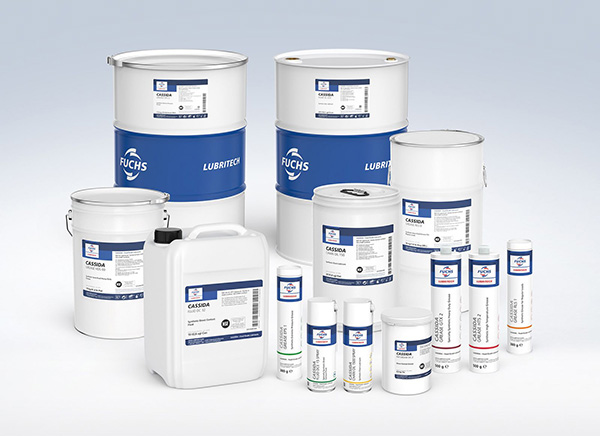
Wide range of applications for H1 lubricants
The composition of the individual food grade lubricants is subject to a continuous optimization process in order to guarantee the best possible suitability for the respective application at all times. The comprehensive CASSIDA portfolio covers all areas of application for the food, feed, medical and cosmetics industries.
H1 lubricants from FUCHS are mainly used in the following areas:
- Beverage & brewery industry
- Meat and poultry processing
- Dairy processing
- Bakery & confectionery
- Edible oil production
- Animal feed industry
CASSIDA lubricants handle the most diverse applications. CASSIDA products are successfully used even at extreme temperatures from -50°C to over 300°C, in spiral stoves and in heat transfer systems.
FUCHS is one of the world's largest manufacturers of special lubricants. With the development of suitable solutions for specific needs, FUCHS clearly stands out as a lubricant supplier from other companies. Together with customers, individual solutions and lubricants adapted to the respective requirements can be designed.
Feel free to contact us to find suitable and NSF H1 certified lubricants for your company. Our team of experts will advise you without obligation on H1 lubricants and the relevant regulations!


